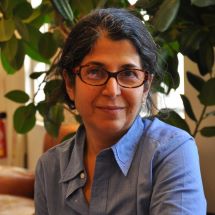Install this application on your home screen for quick and easy access when you’re on the go.
Just tap then “Add to Home Screen”
© Photo by Thomas Arrivé/Sciences Po
Speaker
Béatrice Hibou, Sciences Po
Chair
Jean-Michel Eymeri-Douzans, Sciences Po Toulouse
Held as part of our House Series, this year's Stein Rokkan Lecture reflected on the fight for liberty of a French-Iranian scholar Fariba Adelkhah, and examined the challenges to scientific freedom both in authoritarian countries and democracies.
Fariba Adelkhah is a French-Iranian scholar, and Director of Research at Sciences Po, Paris. In her role as a researcher, and based solely on her anthropological work, she was arrested at Tehran airport on 5 June 2019. Fariba was then detained in Iran's Evin Prison, until her recent release, in February 2023.
Throughout her difficult personal journey, Fariba has continuously embodied the categorical imperative of scientific freedom and the highest intellectual and moral standards.
In this lecture, Béatrice Hibou, Senior Researcher at the Sciences Po Centre for International Studies, reflected on Fariba's fight for liberty to illustrate what this embodiment of scientific freedom truly means, opening the floor to a debate on current trends that challenge scientific freedom, not only in authoritarian countries like Iran but also in democracies. Read more.
Our renowned Stein Rokkan Lecture is typically held annually as part of the Joint Sessions of Workshops. For the third year running, we were thrilled to be opening the lecture to the broader ECPR community, as part of our House Series.

Fariba Adelkhah, director of research at Sciences Po, is an anthropologist focusing mainly on Iran and Afghanistan. Her work focuses on social practices rather than on discourses or institutions.
She has shown the complexity of the religious field from the analysis of pilgrimages, strategies of charity, forms of devotional sociability.
In a very Tocquevillian way, Fariba has identified the lines of continuity from the old monarchical regime to the Islamic Republic, particularly in the agrarian domain, by studying the elections. She insisted on the bureaucratisation and secularisation of society, institutions and religion itself. In Afghanistan, she focused on the land dimension of the war.
She has notably written La Révolution sous le voile. Femmes islamiques d’Iran (Karthala, 1991), Thermidor en Iran (Editions Complexe, 1993), Etre moderne en Iran (Karthala, 1998) – including the new extended edition in 2006, and Les Mille et une frontières de l’Iran. Quand les voyages forment la nation (Karthala, 2012).
She edited The Moral Economy of the Madrasa. Islam and Education Today (Routledge, 2011), Voyages du développement. Emigration, commerce, exil (Karthala, 2007) and Ramadan et politique (CNRS Editions, 2000).
Béatrice Hibou is a specialist in political economy and political sociology and director of research at CNRS – CERI/Sciences Po. She works on the political meaning of neoliberal reforms, on the transformation of the state and on the exercise of power and domination from a theoretical perspective of comparative historical sociology inspired by Michel Foucault, Michel de Certeau and especially Max Weber.
Her fieldwork is mainly in sub-Saharan Africa and the Maghreb for which she shows the complexity of the processes of legitimization. Since the arrest of her friend and colleague, Fariba Adelkhah, she heads her support committee and devotes part of her research to the issue of scientific freedom.
Her recent publications include Political Anatomy of Domination (Palgrave, 2017), La bureaucratisation du monde à l’ère néolibérale (La burocratización del mundo en la era neoliberal, Dado Ediciones, 2020) and Tisser le temps politique au Maroc. Imaginaire de l’Etat à l’âge néolibéral (Karthala, 2020 with Mohamed Tozy).
She edited The Moral Economy of the Madrasa. Islam and Education Today (Londres, Routledge, 2011), Voyages du développement. Emigration, commerce, exil (Paris, Karthala, 2007) Ramadan et politique (Paris, CNRS Editions, 2000).
Loading news
Loading key dates